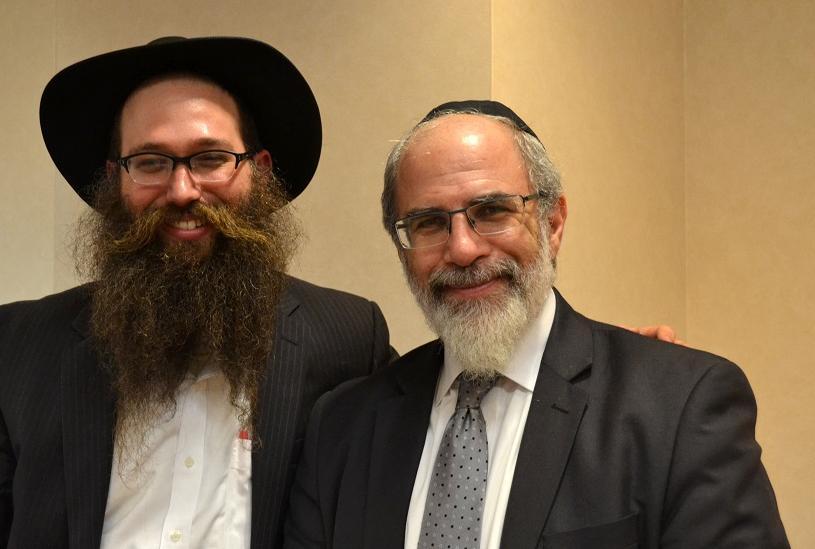Bridging the Lower and Upper Worlds
LAS hosts reading with poet and professor Yehoshua November
“What makes this work ‘poetry’?” asked Dr. Miriam Grossman, chair of the English department at Lander College of Arts and Sciences (LAS) in Flatbush to an audience of students, faculty, and poetry enthusiasts on a rainy evening in early December. The stories are accessible, the images are vivid, and the words do not rhyme.
“If you read it patiently enough, carefully enough, and slowly enough, you discover that somewhere in the middle of each story, you suddenly experience the magical leap that is poetry,” she said. “You come to a word or phrase that lifts you - you’re almost propelled to another level of insight, understanding, feeling, another plane of existence - to another world.”
In the poetry of Yehoshua November, award-winning poet and professor of writing at LAS and Rutgers University, this “bridging” is not a poetic technique, but the very subject matter of his poems. His work, which often addresses G-d and integrates Jewish mysticism and Chassidic philosophy, confronts the difficulties and paradoxes of contemporary life. This tension and connection between the mundane world and the spiritual world is the fabric of his poems, and its truth echoes with his listeners. “He gives us the search, his search, our search, of the meeting place of those two worlds,” continued Dr. Grossman. “We’re always looking for the point at which those two worlds meet and which one of them then transforms and sanctifies the other, and that is really the subject of his poems.”
The Soul In A Body (21:25)
is like an old Russian immigrant
looking out his apartment’s only window.
Yes, yes, he says.
The landlord printed my name in block letters
on the lobby directory
decades ago.
All correspondence
has been forwarded to this address.
But I am not from here. I am not
from here at all.
- From Two Worlds Exist by Yehoshua November
In the LAS auditorium, Professor November shared the background of several of his poems and read from his two published collections, God’s Optimism, winner of the Main Street Rag Poetry Book Award and finalist for L. A. Times Book Prize, and Two Worlds Exist, which was a finalist for the National Jewish Book Award and the Paterson Poetry Prize.
In concluding remarks before an open Q&A session, Dean Henry Abrahamson defined a poet as, “someone who can take an ineffable experience and give it a picture in our minds, all at once.” He shared the experience of Professor November’s poetry that deeply resonated with the audience and praised his genius and insight: “We are drawn into a mundane situation, captured by that metaphor, and, like the rustling of a curtain, we get a sense that there is another world behind this one. There is a point where the supernatural world pokes through, and for a second while the concealment is removed, we catch a fleeting glimpse of the divinity behind the veil in which we live.”
Professor November’s advice to writers? “Write about what is most meaningful to you. When you speak about the particulars on your experience, that becomes vivid, and then others can relate.”
Yehoshua November’s work has been featured in the New York Times Sunday Magazine and Sun Magazine, among others. He has been interviewed by several publications, including the Jerusalem Post, Jewish Action, Jewish Week, and his poetry has been reviewed by the Chicago Tribune, The Rumpus, the Jewish Book Council, and others.
Baal Teshuvas at the Mikvah (15:10)
Sometimes you see them
in the dressing area
of the ritual bath,
young bearded men unbuttoning
their white shirts,
slipping out of their black trousers,
until, standing entirely naked,
they are betrayed by the tattoos
of their past life:
a ring of fire climbing up a leg,
an eagle whose feathery wing span
spreads the width of the chest,
or worse, the scripted name of a woman
other than one’s wife.
Then, holding only a towel,
they begin, once more, the walk
past the others in the dressing room:
the rabbi they will soon sit before
in Talmud class,
men with the last names
of the first Chasidic families
almost everyone,
devout since birth.
And with each step,
they curse the poverty
that keeps the dark ink
etched in their skin,
until, finally, they descend the stairs
of the purifying water,
and, beneath the translucent liquid,
appear, once again,
like the next man,
who, in all this days,
has probably never made a sacrifice
as endearing to God.
- From G‑d’s Optimism by Yehoshua November
Upstairs the Eulogy, Downstairs the Rummage Sale (10:48)
The beloved Yiddish professor
passed away on the same day
as the synagogue’s rummage sale,
and because they could not bear
the coffin up the many steps
that led to the sanctuary,
they left it in the hallway downstairs,
and because I was not one of his students,
and it didn’t matter if I heard the eulogy,
they told me to stay downstairs,
to watch over the body and recite Psalms.
And I thought,
this is how it is in the life and death of a righteous man:
upstairs, in the sanctuary, they speak of you in glowing terms,
while down below your body rests beside
old kitchen appliances.
And I recited the Psalms as intently
as I could over a man I had only met once,
and because I knew where he was headed,
and you and I were to wed in a few months,
I asked that he bring with him a prayer for a good marriage.
And this is how it is in the life and death of a righteous man:
strangers pray over the sum of your days,
and strangers ask you to haul their heavy requests
where you cannot even take your body.
- From G‑d’s Optimism by Yehoshua November


